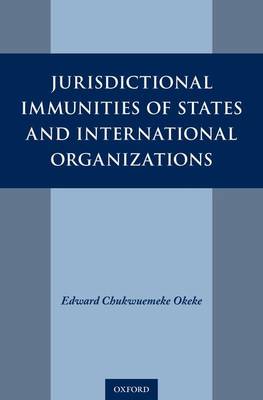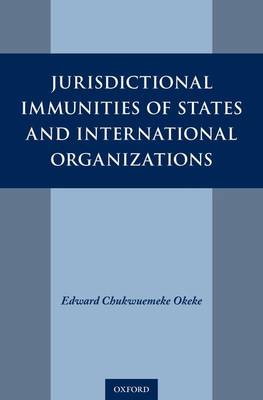
- Afhalen na 1 uur in een winkel met voorraad
- Gratis thuislevering in België vanaf € 30
- Ruim aanbod met 7 miljoen producten
- Afhalen na 1 uur in een winkel met voorraad
- Gratis thuislevering in België vanaf € 30
- Ruim aanbod met 7 miljoen producten
Zoeken
Jurisdictional Immunities of States and International Organizations
Edward Chukwuemeke Okeke
Hardcover | Engels
€ 115,95
+ 231 punten
Omschrijving
This book covers the relationship between the jurisdictional immunities of States and international organizations, addressing their similarities and dissimilarities. Their relationship with diplomatic immunity is also examined. It considers that the immunity of international organizations was historically conceived in terms of State immunity. The major aim of this book is to clarify the conceptual confusion that has often marred the understanding of the law of the, different but interrelated, jurisdictional immunities of both States and international organizations. The approach is to holistically analyze and synthesize select and relevant opinions of international and national courts. To achieve this, the book focuses more on what the law is than on what it should be. An understanding of the law is more useful to a practitioner than a criticism of it. The book is not an exegesis on everything immunity. The jurisdictional immunities of heads of State and of diplomats are beyond the scope of this book, and are only tangentially examined. The book concludes by making the case that the jurisdictional immunities of States and international organizations are not only sustainable but also necessary for international relations and cooperation. The author intends to position the book to be of use both to scholars and practicing lawyers and legal advisers in government and international organizations, as well as to lawyers whose practice concerns issues and laws of privileges and immunities.
Specificaties
Betrokkenen
- Auteur(s):
- Uitgeverij:
Inhoud
- Aantal bladzijden:
- 408
- Taal:
- Engels
Eigenschappen
- Productcode (EAN):
- 9780190611231
- Verschijningsdatum:
- 31/05/2018
- Uitvoering:
- Hardcover
- Formaat:
- Genaaid
- Afmetingen:
- 157 mm x 236 mm
- Gewicht:
- 675 g

Alleen bij Standaard Boekhandel
+ 231 punten op je klantenkaart van Standaard Boekhandel
Beoordelingen
We publiceren alleen reviews die voldoen aan de voorwaarden voor reviews. Bekijk onze voorwaarden voor reviews.











